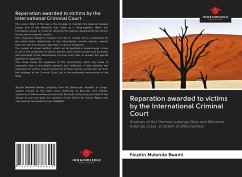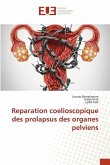The raison d'être of the law is the struggle to maintain the balance between beings and all the elements that make up a living-together. Within this framework, justice is a tool for restoring this balance disturbed by the actions of one person towards another.This unsavoury activity is however not rare in society and is responsible for the author-victim relationship. In the international criminal system, several tools are set up to ensure reparation in case of imbalance.The context of armed conflicts, which can be qualified in several ways in law, is rich in the production of victims and the most recent system built by States and entrusted to the International Criminal Court tries to answer the age-old question of reparation.This study shows the weakness of this construction, which only leads to reparation that is essentially symbolic and ineffective. It also believes that reparation to victims should concern all of them and be carried out, far from the buildings of the Criminal Court, but in the existential environment of the latter.








